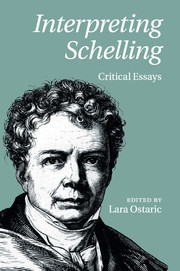Book contents
- Interpreting Schelling
- Interpreting Schelling
- Copyright page
- Contents
- Notes on contributors
- Acknowledgments
- Method of citation
- Introduction
- Chapter 1 The early Schelling on the unconditioned
- Chapter 2 Schelling and skepticism
- Chapter 3 The concept of life in early Schelling
- Chapter 4 Knowledge and pleasure in the aesthetics of Schelling
- Chapter 5 “Exhibiting the particular in the universal”: philosophical construction and intuition in Schelling’s Philosophy of Identity (1801–1804)
- Chapter 6 “Identity of identity and non-identity”: Schelling’s path to the “absolute system of identity”
- Chapter 7 Idealism and freedom in Schelling’sFreiheitsschrift
- Chapter 8 Beauty reconsidered: freedom and virtue in Schelling’s aesthetics
- Chapter 9 Nature and freedom inSchelling and Adorno
- Chapter 10 Church and state: Schelling’s political philosophy of religion
- Chapter 11 Schelling’s critique of Hegel
- Bibliography
- Index
Chapter 4 - Knowledge and pleasure in the aesthetics of Schelling
Published online by Cambridge University Press: 05 October 2014
- Interpreting Schelling
- Interpreting Schelling
- Copyright page
- Contents
- Notes on contributors
- Acknowledgments
- Method of citation
- Introduction
- Chapter 1 The early Schelling on the unconditioned
- Chapter 2 Schelling and skepticism
- Chapter 3 The concept of life in early Schelling
- Chapter 4 Knowledge and pleasure in the aesthetics of Schelling
- Chapter 5 “Exhibiting the particular in the universal”: philosophical construction and intuition in Schelling’s Philosophy of Identity (1801–1804)
- Chapter 6 “Identity of identity and non-identity”: Schelling’s path to the “absolute system of identity”
- Chapter 7 Idealism and freedom in Schelling’sFreiheitsschrift
- Chapter 8 Beauty reconsidered: freedom and virtue in Schelling’s aesthetics
- Chapter 9 Nature and freedom inSchelling and Adorno
- Chapter 10 Church and state: Schelling’s political philosophy of religion
- Chapter 11 Schelling’s critique of Hegel
- Bibliography
- Index
Summary
Information
- Type
- Chapter
- Information
- Interpreting SchellingCritical Essays, pp. 71 - 90Publisher: Cambridge University PressPrint publication year: 2014
Accessibility standard: Unknown
Why this information is here
This section outlines the accessibility features of this content - including support for screen readers, full keyboard navigation and high-contrast display options. This may not be relevant for you.Accessibility Information
- 2
- Cited by
